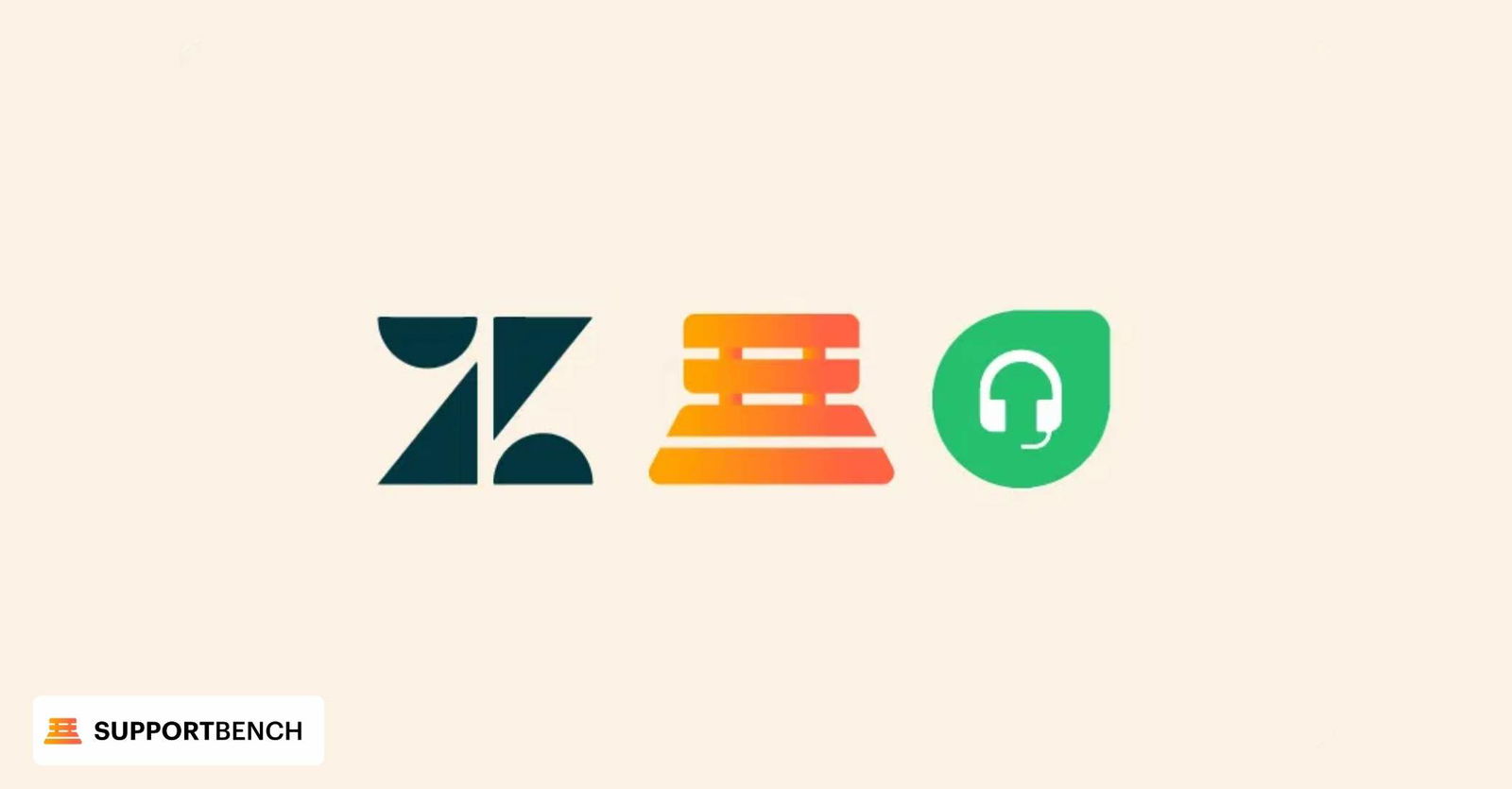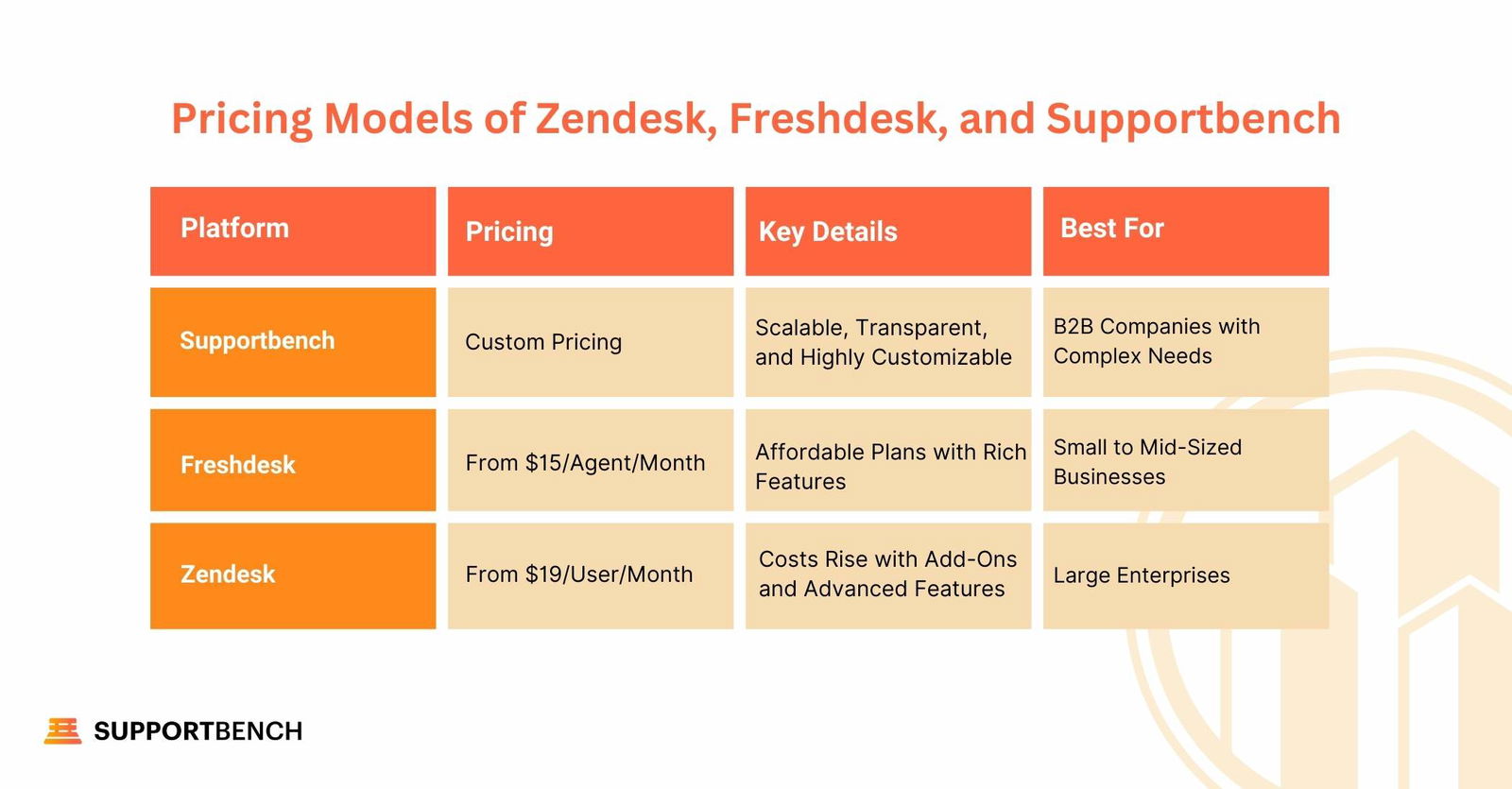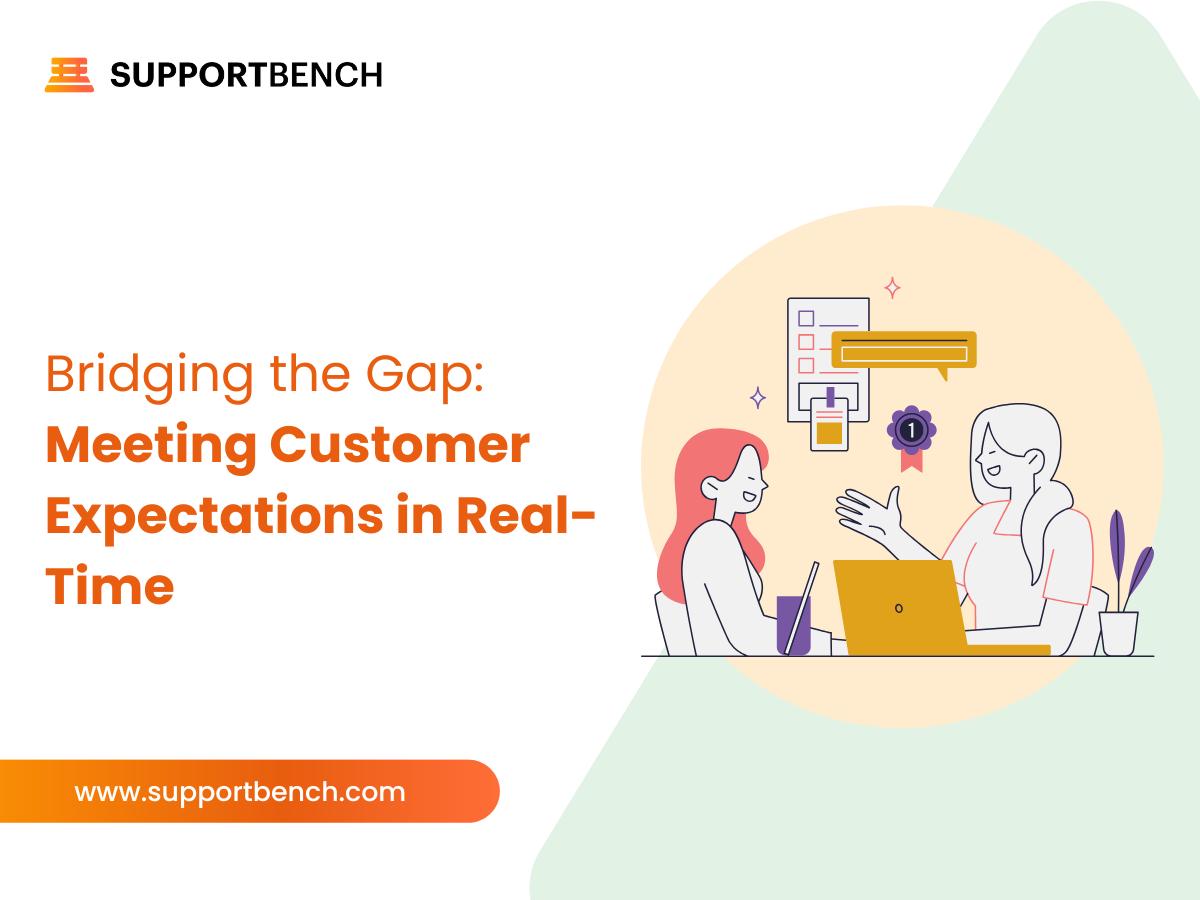In 2025, customer support continues to play a vital role in driving business success, impacting customer retention, loyalty, and operational efficiency. Choosing the right support software with features like AI integration, scalability, and customization is essential for meeting evolving customer expectations.
The ideal customer support platform strikes a balance between operational efficiency and delivering a seamless user experience for both customers and support teams.
This blog compares three leading customer support platforms—Zendesk, Freshdesk, and Supportbench—evaluating their pricing, customization, scalability, and unique strengths. Designed to guide IT managers, customer support leaders, and business owners, this in-depth comparison highlights Supportbench as the ultimate solution for B2B companies in 2025.

Platform Overviews: Zendesk, Freshdesk, and Supportbench
Choosing the right customer support software is critical for fostering effective customer interactions. Below, we explore three leading platforms—Zendesk, Freshdesk, and Supportbench—focusing on their key features, strengths, and suitability to enhance efficiency, scalability, and customer satisfaction.
Zendesk
Zendesk remains one of the most reliable and widely used customer support platforms in the industry.
Known for its robust tools, seamless omnichannel routing, and advanced AI capabilities, Zendesk caters to businesses of all sizes. It is particularly favoured by enterprises and growing companies seeking feature-rich, scalable solutions to manage complex support operations.
Key Features and Strengths
Zendesk enhances workflows and customer satisfaction with its powerful tools and continuous innovation. Notable updates for 2025 include:
- Agent Copilot Enhancements: Zendesk’s Copilot feature now allows agents to override or cancel auto-assist suggestions during response editing, providing greater control over ticket management.
- Omnichannel Routing: Enabled by default for new and trial accounts, this feature ensures seamless integration across email, chat, calls, and messaging, optimizing ticket distribution and response times.
- Advanced Data Privacy: The Advanced Data Privacy and Protection add-on offers administrators detailed log access via the Admin Center, ensuring transparency and enhanced security.
- App Builder: Currently in an Early Access Program (EAP), Zendesk’s no-code App Builder enables administrators to create custom apps without technical expertise, leveraging AI for greater efficiency.
Target Audience
Zendesk is ideal for small businesses, medium-sized companies, and large enterprises seeking scalable customer support solutions. Its advanced features, omnichannel capabilities, and continuous innovation make it a strong choice for organizations aiming to optimize service operations while integrating cutting-edge AI tools.
Freshdesk
Freshdesk is a versatile customer support platform designed to meet the needs of businesses of all sizes.
Known for its ease of use and affordability, it offers robust tools that streamline customer interactions and ensure efficient support operations.
Freshdesk’s customizable solutions make it a strong choice for startups, SMBs, and even larger enterprises seeking scalable support capabilities.
Key Features and Strengths
Freshdesk enhances service operations with innovative tools that deliver exceptional customer experiences:
- Omnichannel Support: Enables seamless communication across email, chat, phone, and social media, providing consistent customer experiences on multiple platforms.
- AI-Powered Assistance: Powered by Freddy AI, Freshdesk automates routine tasks, delivers actionable insights, and facilitates faster query resolution, boosting agent productivity.
- Collaboration Tools: Features like team inboxes, shared ownership, and agent collision detection ensure streamlined teamwork and efficient ticket management.
- Scalability: Whether for a growing startup or an established enterprise, Freshdesk scales with your business to meet increasing support demands.
- Affordable Pricing: Offers flexible pricing tiers to accommodate various budgets, making it accessible for small and medium-sized businesses.
Target Audience
Freshdesk is best suited for small to medium-sized businesses (SMBs) but also supports larger enterprises. Its user-friendly interface, cost-effective pricing, and customizable solutions appeal to companies prioritizing simplicity and affordability.
Freshdesk Updates for 2025
Freshdesk continues to evolve with updates aimed at improving efficiency and the user experience:
- Advanced AI Enhancements: Freddy AI now provides deeper insights into customer behaviour, helping businesses proactively address issues and improve satisfaction scores.
- Workflow Automation: Expanded capabilities allow for the creation of more complex workflows, reducing manual tasks and improving response times.
- Enhanced Integration: New integrations with popular CRMs and marketing platforms make it easier to connect support operations with existing systems.
- Self-Service Improvements: Upgraded knowledge base tools enable faster content creation and real-time article suggestions, empowering customers with quick resolutions.
- Security Upgrades: Advanced encryption and compliance features align with updated global data protection regulations, enhancing customer trust.
Supportbench: The Ultimate Solution for B2B Customer Support
Supportbench delivers comprehensive and customizable support solutions specifically designed for B2B companies.
By prioritizing customization, scalability, and advanced AI capabilities, Supportbench addresses the complex needs of organizations managing intricate customer interactions, making it an ideal choice for 2025.
Key Features
Supportbench redefines AI-powered customer support with innovative tools tailored to elevate B2B customer experiences:
- Unmatched Customization: Adapt Supportbench to unique business workflows, delivering highly personalized client experiences.
- AI-Powered Insights: Predictive analytics, automated workflows, and intelligent routing streamline operations, enhancing efficiency and reducing response times.
- Omnichannel Communication: Seamlessly manage interactions across email, live chat, social media, and more for consistent support experiences.
- Service-Level Management: Track and enforce SLAs effectively, ensuring high-impact tasks are prioritized to meet customer expectations.
- Robust Reporting Tools: Generate detailed reports to analyze team performance, customer satisfaction, and service trends, enabling data-driven decisions.
Strengths
Supportbench stands out as an innovative platform that combines robust features with the flexibility needed to address dynamic B2B requirements:
- Ideal for B2B Needs: Designed for businesses managing complex workflows and high-touch customer service.
- Scalability: Built to handle growth, Supportbench adapts effortlessly to the increasing demands of enterprise-level clients.
- Seamless Integration: Connects with CRM systems, sales tools, and other platforms to create a unified ecosystem.
- Proactive Support: Anticipates customer needs and resolves issues before they escalate, enhancing satisfaction and loyalty.
Target Audience
Supportbench is the go-to solution for B2B companies in SaaS, manufacturing, and professional services industries. These businesses benefit from Supportbench’s ability to handle intricate customer interactions, ensure reliability, and deliver tailored solutions.
Transform Your Customer Support with Supportbench
In 2025, Supportbench will continue to advance its AI-powered customer support capabilities, focusing on innovation to meet the demands of B2B companies:
- Enhanced AI Capabilities: Advanced machine learning models for improved ticket categorization, predictive analytics, and automated escalations.
- Self-Service Portals: Upgraded knowledge base tools for an intuitive self-service experience.
- Custom Workflow Automation: Expanded options for automating repetitive tasks, empowering support teams to focus on complex issues.
- Real-Time Collaboration: Improved tools for cross-team collaboration, ensuring faster resolutions for high-priority cases.
- Advanced Security Features: Enhanced compliance with regulations like GDPR, providing robust safeguards for sensitive information.
What are the main differences between Zendesk, Freshdesk, and Supportbench?
Selecting the ideal customer support software requires understanding how platforms compare in key areas such as AI integration, customization, scalability, and user experience.
Below, we explore how Zendesk, Freshdesk, and Supportbench stack up in 2025, highlighting the unique strengths and features of each platform.

AI Integration
AI integration has become a cornerstone of modern customer support, enabling smarter workflows, predictive insights, and personalized interactions:
- Zendesk: Offers AI features like agent copilot suggestions and auto-routing to boost efficiency, but advanced capabilities may require premium plans.
- Freshdesk: Uses AI-powered bots to automate responses and streamline workflows, catering well to high-volume queries for SMBs.
- Supportbench: Stands out with advanced AI-powered customer support, including predictive analytics, contextual insights, and automated escalations, making it the most innovative platform for B2B needs.
Customization
Customization is vital for aligning customer support software with unique business requirements:
- Zendesk: Provides flexibility through APIs and integrations, but advanced customization may require developer expertise.
- Freshdesk: Offers easy-to-use templates and basic customization, ideal for SMBs seeking straightforward solutions.
- Supportbench: Delivers unparalleled flexibility with a highly adaptable interface and Supportbench knowledge base features, enabling tailored workflows for complex B2B operations.
Scalability
Scalability is crucial for businesses anticipating growth:
- Zendesk: Suitable for enterprise-level operations but may be overly complex for smaller teams.
- Freshdesk: Designed for growing SMEs with flexible pricing and scalability options, though it may lack depth for large enterprises.
- Supportbench: Built specifically for B2B companies, offering enterprise-grade functionality and seamless support for rapid scaling without sacrificing simplicity.
User Experience
User experience determines how effectively platforms enable seamless interactions for both agents and customers:
- Zendesk: Features a robust interface but may involve a steep learning curve for new users.
- Freshdesk: Intuitive and beginner-friendly, catering well to smaller teams, though advanced users might find it limited.
- Supportbench: Strikes a balance between simplicity and advanced features, offering an intuitive platform tailored to fast-paced B2B industries.
Why Supportbench Stands Out
Supportbench emerges as the most versatile and innovative platform in this comparison, combining advanced AI-powered customer support, deep customization, and enterprise-grade scalability. Its tailored features make it the ideal solution for B2B companies managing complex workflows and high-touch customer interactions.
How do the pricing models of Zendesk, Freshdesk, and Supportbench compare?
Pricing plays a critical role in choosing the right customer support software. Understanding the costs and value of Zendesk, Freshdesk, and Supportbench helps businesses make informed decisions that align with their budgets and operational needs.
Below is a detailed comparison of their 2025 pricing models.

Zendesk Pricing
Zendesk provides tiered pricing plans that cater to businesses of all sizes:
- Team Plan: Entry-level features for smaller teams at a competitive price point.
- Professional Plan: Enhanced capabilities, such as advanced reporting and automation, designed for scaling businesses.
- Enterprise Plan: Comprehensive tools, including custom workflows and detailed analytics, tailored to the needs of large organizations.
While Zendesk offers powerful features, costs can increase significantly with add-ons and advanced options, making it a better fit for larger enterprises.
Freshdesk Pricing
Freshdesk offers transparent and modular pricing options, including both free and paid plans:
- Free Plan: Basic support tools, ideal for small teams or startups.
- Growth Plan: Adds features like custom workflows and analytics for growing businesses.
- Pro and Enterprise Plans: Include advanced omnichannel support, SLA management, and AI-powered chatbots for organizations with higher support demands.
Freshdesk’s affordability and flexibility make it a top choice for small to mid-sized businesses, though enterprise users may find its advanced features somewhat limited.
Supportbench Pricing
Supportbench sets itself apart with its transparent and value-driven pricing model tailored for B2B organizations:
- Flexible licensing options that accommodate businesses of all sizes and budgets.
- Enterprise-grade features included as standard, such as advanced SLA management, AI-powered customer support, and tailored onboarding without additional costs.
Supportbench’s custom pricing ensures businesses only pay for what they need, offering exceptional scalability and flexibility for companies managing complex customer interactions.
Why Pricing Matters
Zendesk, Freshdesk, and Supportbench offer pricing models that reflect their target audiences and feature sets. While Zendesk caters to large enterprises with robust requirements, Freshdesk is a cost-effective solution for smaller businesses.
Supportbench stands out for B2B organizations, offering a high level of customization and enterprise-grade features without hidden fees.
Pros and Cons: A Balanced View of Each PlatformPlatform’sges and Potential Drawbacks
When choosing the best customer support software for 2025, understanding each platform’s strengths and potential drawbacks is crucial. Below is a comparison of Zendesk, Freshdesk, and Supportbench to help businesses make informed decisions.
Zendesk: Pros and Cons
Pros:
- Highly scalable for large enterprises with complex support needs.
- Robust omnichannel support ensures seamless customer interactions across multiple channels.
- Advanced analytics and reporting tools for data-driven decision-making.
- Extensive customization options through APIs and integrations.
Cons:
- Higher pricing, especially for small businesses or those requiring advanced features.
- Complex setup process with a steep learning curve for new users.
Freshdesk: Pros and Cons
Pros:
- Affordable and flexible pricing plans, including a free tier for small teams.
- Intuitive and easy-to-use interface, ideal for SMBs and startups.
- Strong customization options for smaller-scale operations.
- AI-driven features like Freddy AI enhance efficiency by automating routine tasks.
Cons:
- Advanced features like omnichannel support and SLA management are limited to higher-tier plans.
- May lack the depth needed for large enterprises with complex support requirements.
- Occasional slow response times during high-volume operations.
Supportbench: Pros and Cons
Pros:
- AI-powered customer support enhances efficiency with predictive analytics and automated workflows.
- Deep customization options tailored specifically for B2B businesses with unique workflows.
- Built for scalability, adapting effortlessly to the needs of growing enterprises.
- Transparent and flexible pricing ensures businesses pay only for what they need.
Cons:
- As a newer platform, it has fewer user reviews compared to competitors like Zendesk and Freshdesk.
- Some features may require additional customization during setup.
- Advanced tools, while powerful, may necessitate initial training for optimal use.
Summary
Each platform offers unique advantages and limitations:
- Zendesk is best for large enterprises needing scalability and advanced analytics but may pose challenges for smaller businesses due to cost and complexity.
- Freshdesk is an excellent choice for SMBs prioritizing affordability and ease of use, though it may fall short for enterprise-scale needs.
- Supportbench excels in delivering tailored solutions for B2B companies with complex workflows, standing out for its deep customization and AI-driven features despite being newer to the market.
Real-World Applications: How Businesses Leverage Zendesk, Freshdesk, and Supportbench
Real-world examples illustrate how Zendesk, Freshdesk, and Supportbench empower businesses to optimize customer support operations. Below are use cases that highlight each platform’s strengths in action.
Zendesk Use Cases
Zendesk is widely used by technology, eCommerce, and telecommunications companies to manage large-scale, omnichannel support operations:
- Airbnb: Leverages Zendesk’s omnichannel capabilities to handle customer inquiries across social media and email, ensuring quick and consistent responses.
- Shopify: Employs automation to streamline global customer interactions, enabling the efficient management of high volumes of support tickets.
Zendesk’s scalability and robust feature set make it a top choice for businesses with diverse support needs across multiple platforms.
Freshdesk Use Cases
Freshdesk is favoured by businesses looking for affordable and intuitive customer support solutions:
- Sling TV: Uses Freshdesk’s AI-driven ticket routing to manage support requests efficiently, improving resolution times.
- Stanley Black & Decker: Benefits from Freshdesk’s customizable workflows to enhance team productivity and deliver better customer experiences.
Freshdesk’s affordability and flexibility make it ideal for companies aiming to scale their support teams without high upfront costs.
Supportbench Use Cases
Supportbench stands out as the go-to solution for B2B companies with complex customer needs, offering scalable customer support platforms tailored to meet specific requirements:
- Zebra Medical Vision: Leverages AI-powered tools from Supportbench for proactive troubleshooting, enabling the team to identify and resolve potential issues before they escalate.
- Dynatrace: Utilizes Supportbench’s predictive analytics and automation to address performance issues preemptively, ensuring uninterrupted client service.
Supportbench’s flexibility and scalability make it an exceptional choice for B2B organizations needing customized solutions to manage intricate workflows.
Conclusion
In 2025, choosing the right customer support software is critical for business success. While Zendesk and Freshdesk offer strong solutions for many organizations, Supportbench emerges as the ideal platform for B2B companies managing complex workflows and high-touch customer interactions.
With its advanced AI-driven features, deep customization, enterprise-grade security, and exceptional scalability, Supportbench delivers a tailored approach to customer support that adapts seamlessly to evolving business needs. By combining innovation with flexibility, Supportbench empowers organizations to enhance efficiency, anticipate customer needs, and deliver superior service experiences.
For businesses seeking a solution that prioritizes adaptability and long-term growth, Supportbench stands out as the ultimate choice.












